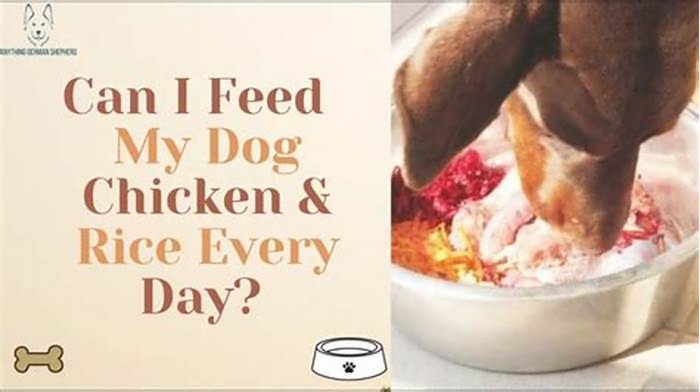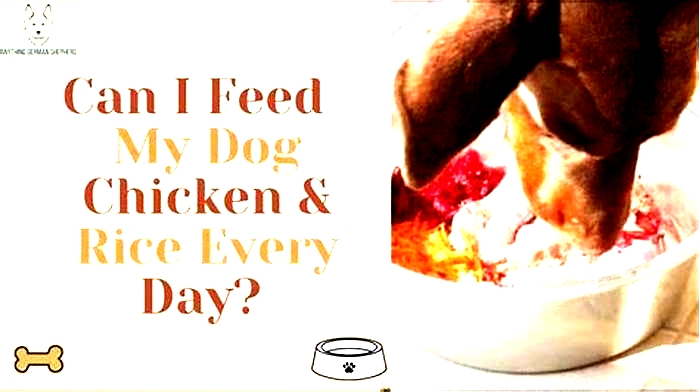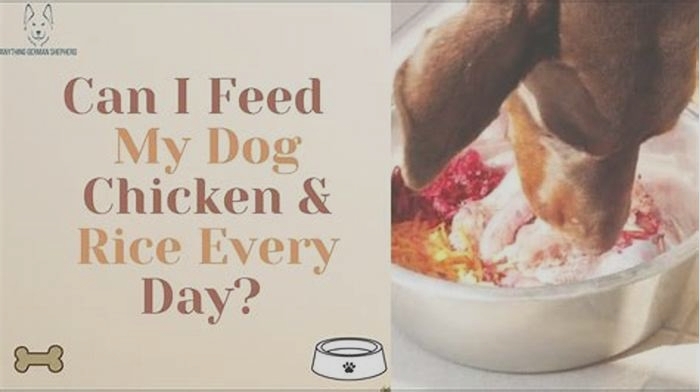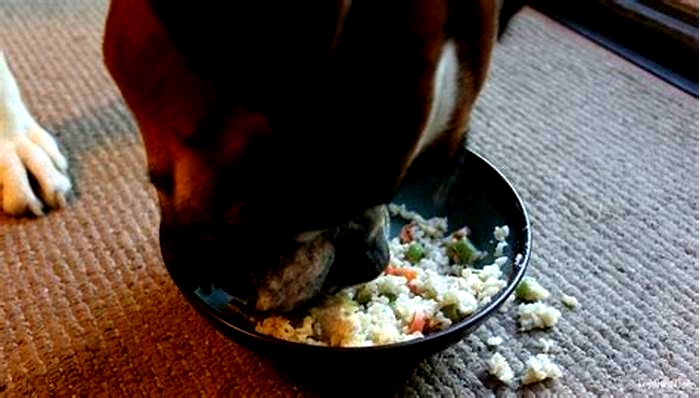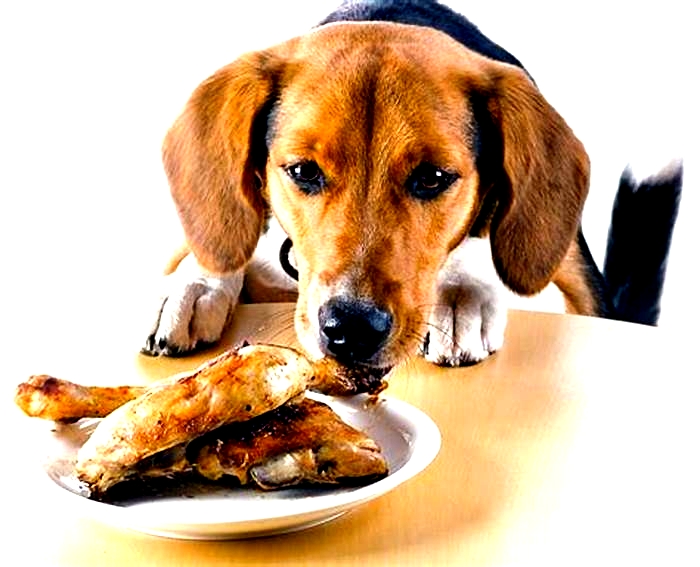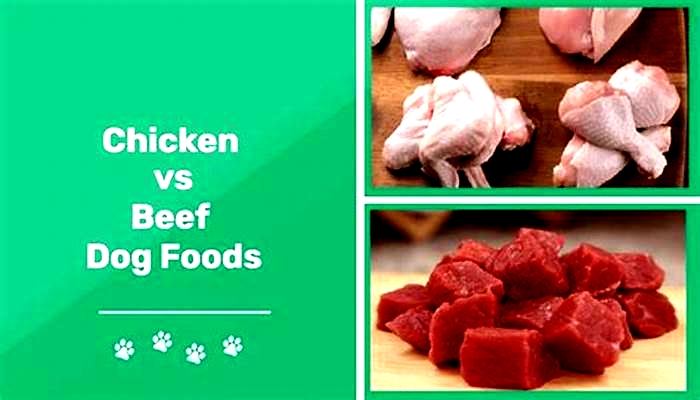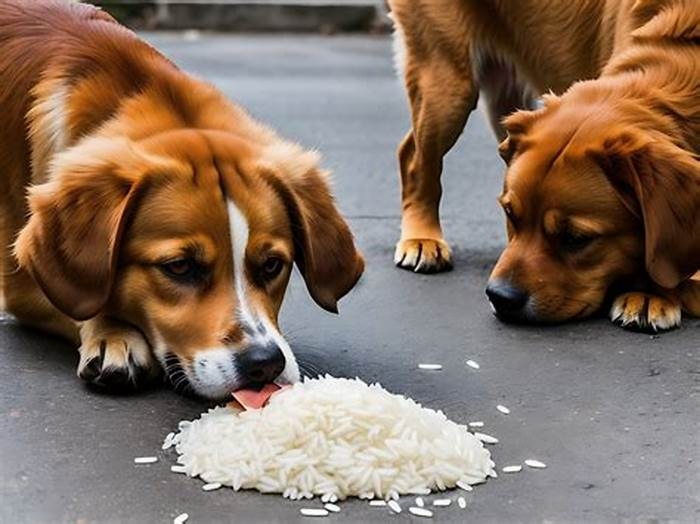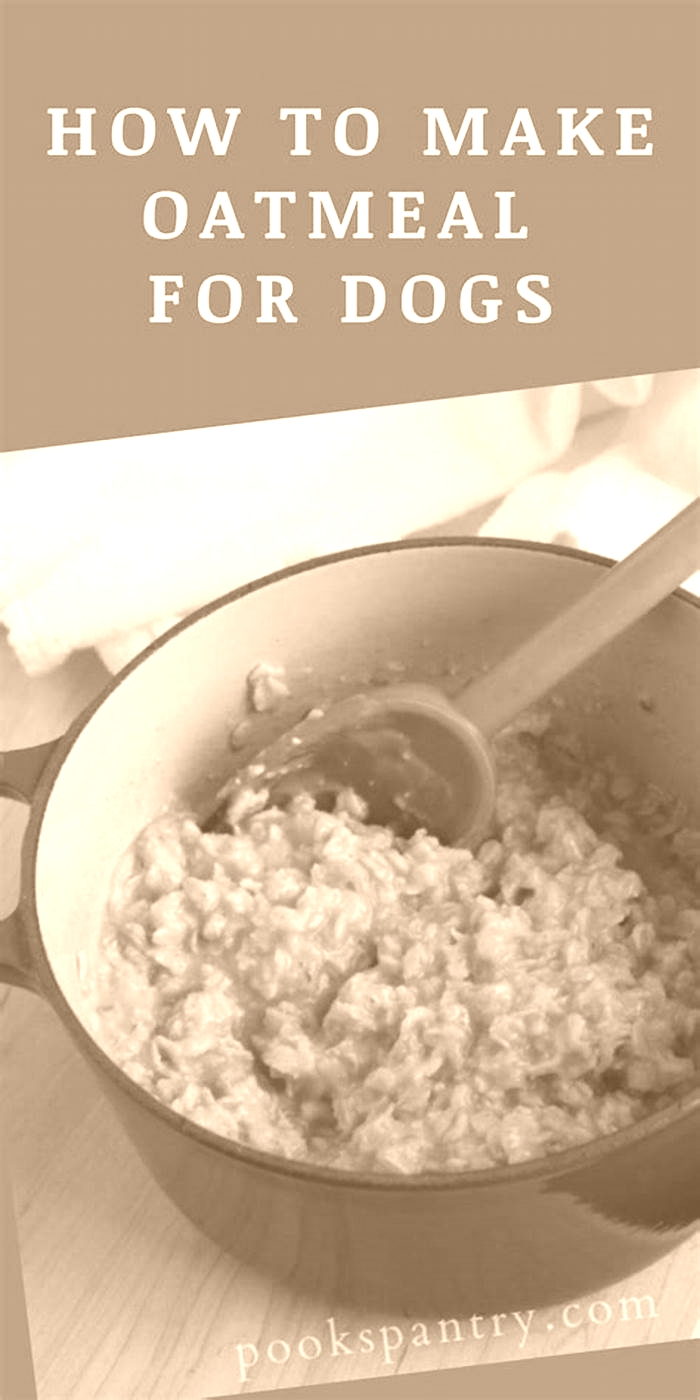Can dogs eat chicken and rice permanently
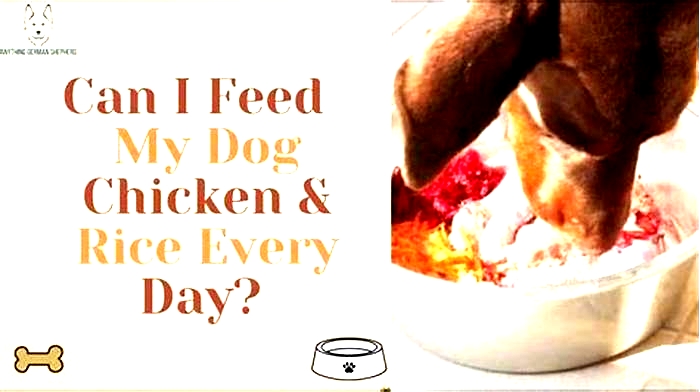
Can Dogs Eat White Rice and Chicken?
The word YES is the simplest possible answer to this question. Both these ingredients (chicken and white rice) are safe for dogs and provide your pets with some useful nutrients. For instance, rice are extremely rich in carbohydrates while chicken accounts for proteins and essential amino acids.
Carbohydrates provide energy whereas proteins are used tobuild strong muscles. This gives a significant nutritional value to this meal. Despitethat, it is an unbalanced diet because a lot of important vitamins and mineralsare missing from it. For this reason, you cannot feed this 2-ingredient meal (alone)for longer periods of time.
Feeding Dogs Chicken and Rice
Has your vet prescribed a bland diet for your ill dog? White rice and chicken is a delicious, cost-friendly recipe that can entice any dog. This recipe is also considered the pups version of chicken soup. Generally, the diagnosis of an upset stomach is what instigates this prescription. Both these ingredients reset the gastrointestinal systems of your dog as they are light and easy-to-digest.
Not only is this recipe very tasty, but its nutrients are also quite effective at recovering the dogs health. Although symptoms of tummy trouble (diarrhea and/or vomiting) are well-known, you should ALWAYS consult your vet. He/she will make sure that there is no problem with this meal as your dog can be allergic to rice.
Can I Feed My Dog Chicken and Rice All the Time?
You can make chicken and white rice a part of your dogsdaily diet but not in massive quantities. Similarly, you need to ensure thatall the necessary nutrition requirements are being fulfilled. For the sake ofyour pups safety, it is highly recommended to discuss the diet plans of yourdog with a vet.
White rice and chicken is an effective homemade remedy fortreating diarrhea in dogs. The simplicity of the ingredients allows your dog todigest easily, which leads to a speedy recovery. However, you cant rely solelyon this meal in the long run. This is because continuous deficiency ofessential nutrients can develop several health issues in your pets.
How to Prepare Chicken and Rice for Dogs?
This single-protein, single-carbohydrate diet is prettyconvenient to prepare if you have the right ingredients. Selecting high-qualityproducts can help you allure your pet towards this bland meal. The following listof instructions can assist you in achieving this goal.
- Purchase the best quality chicken to limit thetoxins. Chicken raised on hormones are more likely to have higherconcentrations of these harmful chemicals.
- Preferably, go for boneless pieces of chickenbreast as they are soft and easily digestible. You may cut these pieces insmall cubes to reduce cooking time. Likewise, make sure that the chicken isskinless and boneless to avoid any further irritation.
- Select long-cooking white rice for preparingthis meal. Even though quick-cooking rice are more convenient, they have alower nutritional value. Similarly, it is advised to avoid brown rice becausethey contain a little too much fiber. Dont forget to rinse the rice beforecooking.
- NEVER include any seasonings (onion, garlic,etc.) in this recipe because they are toxic for dogs. Likewise, all kinds ofoil and butter should be circumvented.
Once you have gathered all the right ingredients, you areall set to cook your dogs meal. Start by boiling 1 cup of chicken cubes (inwater) until they are fully cooked. Remove the chicken from the broth and boil2 cups of white rice in it. When both the ingredients are ready, cool them and feedyour pet. The general rule of thumb is to mix 1/3 portion of chicken to 2/3portion of rice.
Chicken and Rice for Puppies
Typically, puppies are even more prone to gastric unhappiness than their adult companions. Luckily, this white rice and chicken recipe works for them as well. The ratio of rice to chicken remains the same while the overall quantity of the meal will obviously decrease.
The best possible method to feed a puppy (suffering from gastrointestinalissues) is to start with a small quantity. For example, if your puppy regularlyeats 1 cup of food per meal, you should begin by feeding him a quarter cup ofrice and chicken. Observe your pup and if everything goes well, increase thequantity in the next meal.
Whether your puppy is generally stubborn or not, it willbehave a little strange when ill. You have to understand that and try making itas comfortable for him/her as possible. Serving the food in your dogs normaldish is one way of alluring the pet towards the meal.
You can determine the appropriate quantity of food for your dog by clicking here. Alternatively, you can discuss the exact situation with your vet to come up with a prescription.
How much Chicken and Rice for Dogs by Weight?
This recipe of Chicken and rice is the most common blandmeal for dogs. Having said that, the quantity of the meal is heavily dependenton the size and condition of the dog. The very first thing that you need to dois to determine the amount of food that needs to be fed in a day.
Then, you must divide it into smaller meals (4-6) that willbe scattered around the day. For instance, if your dog requires 3 cups of food,feed him about cup of rice and chicken, four times a day. The following chartwill give you a tentative idea about the diet your dog may require.
| Dogs Weight | Amount of Diet |
| <5 pounds | cup |
| 5-15 pounds | cup |
| 16-30 pounds | 1 cup |
| 31-50 pounds | 1 cups |
| 51-75 pounds | 2-3 cups |
| 76-100 pounds | 3-4 cups |
| >100 pounds | 4-5 cups |
Important Note: The exact amount of food should be finalized as per the requirements of your vet.
Please keep in mind that we may receive a small commission when you click our links and make purchases and as an Amazon Associate, this site earns from qualifying purchases. However, this does not impact our reviews and comparisons. We try our best to keep things fair and balanced, in order to help you make the best choice for you.
Can Chickens Eat Rice?
Chickens can devour almost anything their beaks get into, but how about rice? Can chickens eat rice?
The simple answer is YES!
Chickens can feed on rice.
But there are many ways of serving rice and many parts of it that could or could not be given to your bird.
So, in this article, well discuss:
- What type of rice is safe for chickens to consume
- How your chickens can benefit from it
- and what should you be careful of when feeding rice to your chooks
If you constantly feed your chooks with rice, this blog post will help you gain more insights into the benefits and drawbacks of feeding rice to chickens.
So, Can Chickens Eat Cooked Rice?
Yes. And most chickens actually love cooked rice.
Rice is high in carbohydrates, and it is a popular chicken treat worldwide.
However, if youre going to feed your poultry birds with leftover rice, you need to ensure that the rice contains no added salt or spices, as these can harm chickens.
Additionally, you must provide other food options for your birds since they require a balanced diet of grains, protein, and vegetables to stay healthy.
Can Chickens Eat Uncooked Rice?
Chickens have strong digestive systems that can digest any cooked or uncooked food.
Which means, yes, they can also eat raw grains like rice.
In fact, raw rice is packed with more nutrients than cooked.
Wonder what happens when the rice is cooked?
Well, cooking displaces some of the nutrients and minerals the rice offers.
However, always feeding chickens uncooked rice is not recommended, especially for chicks.
Why? Because raw rice can expand in their digestive system and cause blockages, which can be fatal.
So, cooking the rice and mixing it with other foods is best to meet their nutritional needs.
Additionally, chickens should always have access to clean water and grit to aid their digestion.
If youre in a hurry and cant cook rice for your feathered friends, it will be easier to give them raw.
But it should not exceed 20% of their diet.
But how about white rice? Is it safe for your chooks?
Well dive into that below.

Do Chickens Eat White Rice?
Chickens can eat white rice, but it should only be in moderation.
White rice can be a good source of carbohydrates for chickens, but it lacks some essential nutrients compared to other types of rice.
Therefore, there should be other sources of food for them.
What about brown rice, you asked?
Can Chickens Eat Brown Rice?
Yes, chickens can feast on brown rice.
And its actually more nutritious than white rice, making it a better option for your chooks.
It contains antioxidants like flavonoids and phenols, which are beneficial for flocks.
In fact, dietary flavonoids help improve broiler chickens growth performance, blood constituents, and carcass composition.
Its also a safer option for both humans and chickens because theyre less processed than white rice.
Can Chickens Eat Dry Rice?
Aside from cooking, you can also soak the rice with water and leave it for many minutes until it absorbs, softens, and dries before serving it to your chooks.
This process makes it easier for your poultry birds to digest the feed, and chickens will fully benefit from carbohydrate content, giving them energy for everyday foraging.
However, chickens might prefer other flavorful feeds over dry rice.
Besides, like other carbohydrates, it should be mixed with other food for balanced nutrition.
But it still can be a good treat for your poultry birds.
Can Chickens Eat Flavored Rice?
Yes, chickens can take a peck at some flavored rice as long as it contains no harmful ingredients and a large amount of sodium.
But if your table scraps are flavored with your leftover viand and have a high sodium content, its best to wash it first before serving it to your flocks.
Do Chickens Eat Rice Grains?
Rice grains are the rice itself with shells or coverings, and yes, chickens can eat rice grains. It is packed with many nutrients that are essential for chickens growth.
However, as said earlier, it is important to note that rice should not be their primary food source because chickens require a balanced diet.
Mixing rice with other nutritious food options is recommended to ensure their health and well-being.
Can Chickens Eat Rice Cereal?
You can serve any rice cereal to your chickens. It includes puffed rice, rice biscuits, rice flakes, and rice crisps. Is it safe for them?
Yes, it is. Chickens can eat rice cereal as part of their diet if it doesnt have sugar and marshmallow.
In fact, it is nutritious and easier to digest than uncooked rice.
However, some rice cereal might contain safe substances for humans but not for your chickens, and it should not be the only food they consume.
Rice cereal should be given to chickens in moderation and mixed with other nutritious foods to ensure a balanced diet.
It is important to avoid overfeeding chickens with rice cereal as it can cause obesity and other health issues.
Additionally, it is recommended to consult with a veterinarian or poultry expert for specific dietary recommendations for your chickens.
Do Chickens Eat Rice Bran?
For those who dont know, rice bran is the outer layer of rice, and it is separated when the rice is milled.
Aside from the rice, its bran is also a popular product in the market because it is used as feed for many animals like chickens, ducks, and pigs.
With that said, is it safe for chickens? The answer is yes, it is.
In fact, rice bran is also a good source of protein and energy for them!
Theyre easier to digest, especially when powdered.
Moreover, rice bran feeding is popular in most tropical countries, taking up 10 to 30 percent of chicken feed.
Just prepare clean water when feeding rice bran to your chickens in case your birds get choked.

Can Chickens Eat Rice Hulls?
If the rice bran is the outer layer of the rice, the rice hulls are the cover that holds the grains. It is removed during the milling process.
Other millers throw it away and let it decay. After some time, it can be a good fertilizer.
But rice hulls are very useful in the poultry industry because they can help boost the overall growth of chickens.
Based on the 2019 research published in the International Journal of Poultry Science, Lohmann chicks gained more weight after being fed with rice hulls.
However, not all chickens like rice hulls.
Can Chicks Eat Rice?
Definitely, yes.
Chicks can eat any rice, whether cooked, raw, brans, hulls, grains or even rice cereals.
It is safe for them as long as they are old enough to eat soft and hard foods.
However, because theyre still young, they need full nutrition from different kinds of food to have a healthy body.
So, if you want them to grow healthy, its best to offer them a chick starter feed that provides all the essential nutrients needed for their growth.
But at what age can chickens eat rice?
When Can Chickens Have Rice?
Some homesteaders prefer to introduce rice on flocks when they reach six months and older.
Chicks will feast on anything you serve, but its better to introduce the rice when they are old enough to digest hard foods to avoid digestive problems.
But if rice is the only feed option available in your area, you must balance it with other fruits, vegetables, and mealworms to keep your birds healthy.
So, how much do your chickens need?
How Much Rice Can Chickens Eat?
Rice should only take up 10% of their calorie intake. So, a cup of rice should be enough for your birds.
And if youre wondering how often should you feed them with rice, you can serve it to your chooks every 3 to 4 days.
This way, they wont disregard their nutritionally balanced feed.
Is it Ok for Chickens To Eat Rice?
Its common knowledge that rice is a great source of carbohydrates.
But besides carbs, it also contains other essential nutrients that can contribute to a chickens growth and development.
To summarize the nutritional content of 100 grams of rice, refer to the table below.
Nutritional Contents of Rice
| Nutrient | Amount (g) | Daily Value (%) |
| Calories | 130 | |
| Carbohydrates | 28 28.7 g | 9 10% |
| Potassium | 35 mg | 1% |
| Dietary Fiber | 0.4 g | 1% |
| Protein | 2.36 2.7 g | 5% |
| Iron | 1% | |
| Vitamin B6 | 5% | |
| Magnesium | 3% | |
| Calcium | 1% |
So, How Do Chickens Benefit From Rice?
Heres how chickens can benefit from gorging on a few cups of rice.
It Improves the Digestive, Cardiovascular, and Nervous Systems
Niacin (B3) and Thiamine (B1) deficiencies can malfunction the digestive, nervous, and even cardiovascular systems.
Specifically, it can cause appetite loss, tremors, dermatosis, feathering problems, and bowing of the legs, affecting how they walk.
A rice meal can give your chickens enough vitamins B1 and B3 to prevent these health issues.
These nutrients will help boost their metabolic systems and keep their body systems healthy and properly working.
Improves Formation of Bones
The key to stronger bones is having enough magnesium, which most commercial foods fail to provide.
So, can you find this nutrient in rice? Definitely, yes.
Adding rice to your feathered friends diet can help them develop strong bones, which they need because they always forage.
Magnesium also plays a big role in forming eggshells and metabolizing their carbohydrate contents.
Helps Develop the Chicks Brain
Chicks need to learn many things to survive in this vast world.
And as they grow, they must develop their brain to adjust to their changing environment.
Thats why they need vitamin B6, also called Pyridoxine which you can find on rice. This nutrient is essential in developing their brain and regulates the internal clock.
Pyridoxine also plays a big role in breaking down the essential amino acids from the rice itself.
Helps Boost Egg Production
Rice also contains selenium which is essential for chickens, especially during laying, hatching, and ensuring semen quality.
Selenium deficiency can be detrimental to your birds and cause low production and quality of eggs.
And thats where a little rice can help.
It can boost their immunity, stimulate their blood circulation, and help improve their muscle.
Moreover, selenium can also help protect your feathered friends from free radicals and enable them to produce quality eggs.
Luckily, this nutrient is not only found in foods.
Even the soil can contain selenium, too.
So if you allow your chickens to free-range, there are lots of opportunities for them to fulfill this need.
Now, lets talk about how to serve rice to chickens.
How to Feed Rice to Chickens?
As weve mentioned earlier, there are many ways to offer rice to chickens. You can serve it either raw or cooked.
But if you want to avoid causing digestive issues to your flock, we recommend cooking and letting it cool down firstbefore serving it to your chickens.
But remember that raw rice contains more nutrients. So, it really depends on you.
Just make sure not to overfeed them with rice; it should only make up a small portion of their diet.
Finally, provide plenty of fresh water for your chickens to drink alongside their meals.
With these tips in mind, your chickens will be thrilled to enjoy a little bit of rice as a treat from time to time.

FAQs About Chickens Rice Consumption
Do chickens like rice?
Though rice might not be as tasty as other foods, chickens love having it as a treat.
It has essential nutrients that they need from chicks up to older.
Is rice bad for chickens?
Having rice as part of your chickens diet is not bad as long as it doesnt exceed 10% of their calorie intake.
Otherwise, your poultry bird may experience a nutritional imbalance, impacting their health and productivity.
Do chickens eat raw rice?
Since chickens can survive on raw grains, their digestive systems can break down uncooked rice.
They can eat plain raw rice.
Additionally, raw rice is far superior since boiling removes some of the rices vital vitamins and nutrients.
Can chickens have fried rice?
We do not recommend feeding chooks with fried rice because it may cause health issues due to excessive levels of oils and fats.
Most fried rice also contains sauces and salt that are bad for your poultry birds health.
What should you not feed chickens?
You should avoid feeding raw potatoes, avocados, citrus fruits, chocolate, onion, garlic, and spoiled food scraps to your chickens.
Luckily, chickens have an instinct that helps them avoid foods that do more harm than good to their health.

Final Recap: Can Chickens Eat Rice?
Rice is safe for chicken consumption, and it provides several nutritional benefits.
Besides carbohydrates, it contains Niacin, Thiamin, Pyridoxine, Selenium, and Magnesium that support bone formation and their overall growth and development.
However, if you dont want them to ignore their regular feed, serve rice in moderation and ensure they have a balanced diet for better growth and egg production.
And if you want to introduce different kinds of rice to your chickens from the market, check its nutritional value first before buying.


